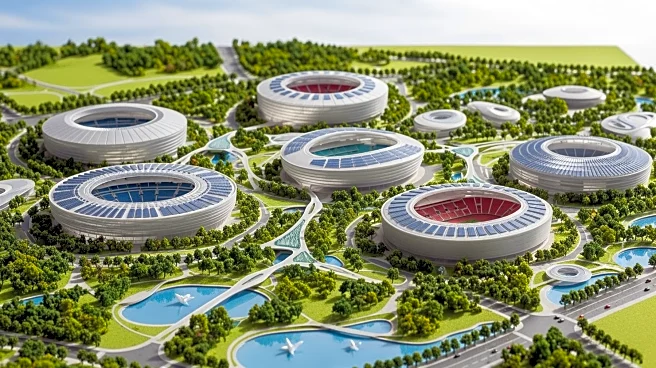What's Happening?
Qiddiya City, located near Riyadh, Saudi Arabia, is rapidly developing into a major sports tourism destination. The city is designed as a play-centered ecosystem, featuring significant sports projects
such as the Prince Mohammed bin Salman Stadium, Speed Park, and Esports and Gaming District. Recently, Qiddiya City hosted Extreme H, a hydrogen-fueled racing event, showcasing advancements in automotive technology and sustainability. The sports tourism sector is expanding globally, driven by experience-seeking travelers and investments in mega-events and smart venues. Saudi Arabia's sports economy is growing at an annual rate of 8.7%, with the sports sector expected to triple in value by 2030, creating over 100,000 jobs.
Why It's Important?
The development of Qiddiya City as a sports tourism hub is significant for the global travel industry, particularly in the Middle East. It represents a shift towards integrating sports, entertainment, and culture into tourism strategies, enhancing visitor experiences and driving economic growth. The city's focus on sustainable sports projects aligns with global trends towards eco-friendly tourism. The expansion of sports tourism contributes to job creation and infrastructure development, reinforcing Saudi Arabia's Vision 2030 goals. This growth in sports tourism also highlights the increasing demand for participatory experiences among Gen Z and Millennials, who are set to dominate global travel spending.
What's Next?
Qiddiya City is poised to host more major sports events, including the 2034 FIFA World Cup, further solidifying its status as a global sports destination. The city plans to develop an F1 track and expand its Esports and Gaming district, attracting year-round visitors. As the city grows, it will continue to integrate sports, entertainment, and culture, offering unique experiences that drive repeat visitation. The focus on sustainable development and innovative sports projects will likely influence other destinations to adopt similar strategies, promoting eco-friendly tourism and cultural exchange.
Beyond the Headlines
The rise of Qiddiya City as a sports tourism hub underscores the broader impact of sports on community building and cultural exchange. Hosting global events fosters infrastructure investment and destination branding, creating lasting emotional connections for visitors. The integration of sports into tourism strategies reflects a shift towards experiential travel, where destinations offer immersive experiences that go beyond traditional sightseeing. This trend highlights the potential for sports to drive tourism flows and economic development, while also promoting healthy lifestyles and cultural understanding.










